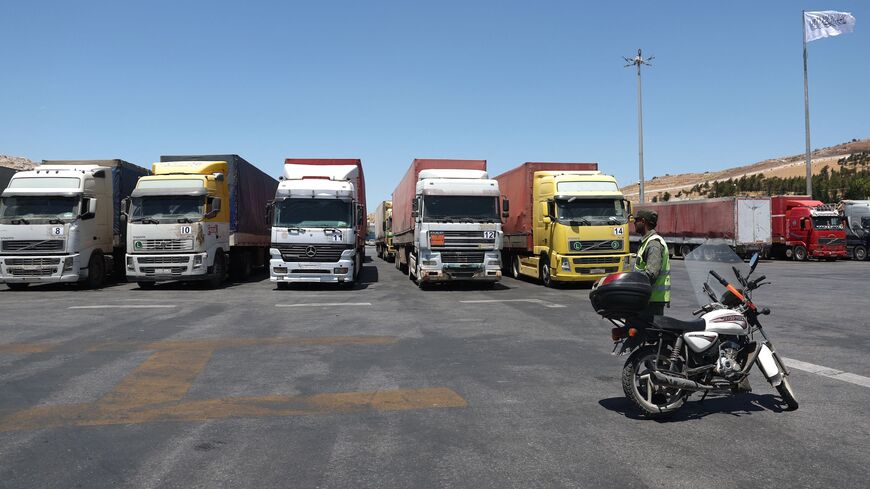WASHINGTON — Faced with a Russian veto, the United Nations Security Council failed to renew its humanitarian operation in northwest Syria Tuesday, an action that will halt aid deliveries in the rebel-held territory at a time when needs have spiked.
The 15-member council missed a July 10 deadline to renew the cross-border aid mechanism, which for nearly a decade has allowed the United Nations to deliver food, fuel, medicine and other assistance to areas outside the control of Syrian President Bashar al-Assad’s government. Today, UN assistance reaches northwest Syria through a sole crossing on the Turkish border called Bab al-Hawa.
The United States and its allies pushed for a year-long renewal of the operation, which UN Secretary-General Antonio Guterres and international aid organizations say is the bare minimum required to ensure basic needs are met.
A vote scheduled for Monday morning in New York was delayed as Russia, which sought a six-month extension, and the rest of the council's members tried to reach a consensus.
On Tuesday morning, Russia vetoed a Swiss and Brazilian-drafted compromise resolution to extend the UN mechanism by nine months. Thirteen other members voted in favor of the deal and China abstained.
US Ambassador Linda Thomas-Greenfield called the Security Council’s failure to adopt the resolution a “sad moment" for the UN's most powerful body and an "act of cruelty" on the part of Moscow.
“Russia has not lived up to its responsibility as a permanent member of this council, and it’s beneath the dignity of this body,” Thomas-Greenfield said.
Ten countries abstained from voting on a rival text put forward by the Russian side, which called for a six-month extension of the Bab al-Hawa aid corridor. The United States, Britain and France voted against the measure backed by Russia and China.
Russia’s UN Ambassador Vassily Nebenzia said the assertion that Moscow killed the UN mandate was “dishonest and disingenuous.”
“If our draft is not supported, then we can just go ahead and close down the cross-border mechanism,” Nebenzia said ahead of the second vote.
Members are now holding closed-door meetings aimed at forging a new deal, and Washington has urged Moscow to return to the negotiating table in good faith.
“The United States will continue to work with council members to renew this life-saving mechanism for the Syrian people,” Nathan Evans, spokesperson for the US Mission to the United Nations, told Al-Monitor.
Along with China, Assad’s ally Russia has used its veto power since 2020 to eliminate three of the original four border crossings from neighboring Turkey, Iraq and Jordan that were established by the Security Council in 2014.
The Russians argue the cross-border operation is a violation of Syrian sovereignty and say humanitarian assistance should instead be delivered from inside the country in what’s known as “cross-line” delivery.
But the United States and its allies say cross-line assistance alone is far from sufficient. Since the Feb. 6 earthquakes, just one cross-line convoy of 10 trucks reached Idlib province from Aleppo. In that same period, more than 3,400 aid trucks reached northwest Syria overland from Turkey under the UN mechanism.
After more than 12 years of war, an estimated 90% of the 4.5 million people in Syria's northwest region are living in poverty. In Idlib province, the country’s last opposition stronghold, much of the population is crammed into tented settlements along the sealed Turkish border.
On Tuesday, a group of six relief agencies including Mercy Corps and the International Rescue Committee condemned the interruption in desperately needed aid delivery.
“The Security Council’s failure to reauthorize UN cross-border aid into northwest Syria today will only add to the anxiety and uncertainty that Syrians living there are already enduring,” they said in a statement. “Today, their most vital lifeline hangs in limbo.”
The standoff over aid access comes as needs in the conflict-ridden country have reached record highs, exacerbated by a cholera outbreak and the twin earthquakes in February that left nearly 6,000 dead in Syria.
In remarks to the press after Russia’s veto, Swiss envoy Pascale Baeriswyl said there was “no time to waste.”
“We will get back to work immediately to find a solution,” Baeriswyl said. “We owe it to the people of Syria.”
Editor's note: This article has been updated since initial publication.








